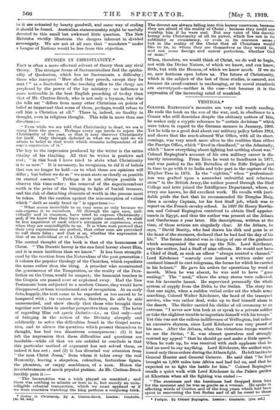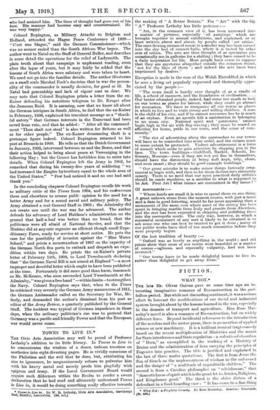VESTIGIA.*
COLONEL REg/NGTON'S memoirs axe very well worth reading. He ends the book on the eve of the war, and, in obedience to a Censor who still flourishes despite the obituary notices of him, he makes only a cryptic reference to " certain decisions " which were taken in regard to the German menace in January, 1906. Yet he tells us a good deal about our military policy before 1914, and shows that the much-abused War Office, with all its short- comings, was very much more alive to the realities than either the Foreign Office, which " lived in cloudland," or the Admiralty, which " knew everything about fighting but nothing about war." Colonel Repington's account of his own military career is dis- tinctly interesting. From Eton he went to Sandhurst in 1877, and was posted to the 4th Battalion of the Rifle Brigade just in time to go with it to India and take part in the capture of the Khyber Pass in 1878. In the eighties," when " professional- ism was grafted upon a somewhat unfruitful and reluctant stem" in the British Army, the author passed through the Staff College and later joined the Intelligence Department, where, as every one knows, he did excellent work. He recalls with justi- fiable pride the fact that he recommended Sir Douglas Haig, then a cavalry Captain, for his first Staff job, which was to report on the French cavalry school. In 1897 Sir Henry Rawlin- son and Colonel Repington contrived to obtain Staff appoint- ments in Egypt, and thus the author was present at the Atbara. and Omdurman a year later. His descriptions, written at the time, of those actions are singularly clear. At the Atbara, he says, " David Beatty, who had drawn his dirk and gone in at the head of the stormers, declared that he had had the day of his life." The future Admiral was in charge of one of the gunboats which accompanied the army up the Nile. Lord Kitchener, says the author, had a Staff of nine officers. He would not have a Chief of Staff, as such an officer " always created a channeL" Lord Kitchener "scarcely ever issued a written order and confined himself to curt telegrams, the forms for which he carried in his helmet." He gave his orders for operations by word of mouth. When he was absent, he was said to have "gone nurling." The " meal," where the army stores were collected, was his favourite haunt. He supervised personally the whole system of supply from the Delta to the Sudan. The story ran that one night, when a sudden verbal order set the whole army marching, Colonel Walter Kitchener, the head of the transport service, who was rather deaf, woke up to find himself alone in the desert. The Sirdar carried his dislike of all ceremony to an extreme. "I never saw him look at or speak to a private soldier or take the slightest trouble to ingratiate himself with his troops." Yet this was not the callous indifference of Wellington, but rather an excessive shyness, since Lord Kitchener was very proud of his men. After the Atbara, when the victorious troops wanted
to see the Birder, " was almost querulous and strongly resisted my appeal " that he should go and make a little speech. When he rode up, he was received with such applause that be
had no need to say anything. Lord Kitchener, the author says,
issued only three orders during the Atbara fight. He lefttactics to General Hunter and General Gatacre. He said that " he had
brought us 1,500 miles into Africa and had fed as, and that he expected us to fight the battle for him." Colonel Repington recalls a quiet walk with Lord Kitchener in the Palace garden at Khartum when all the fighting was ended :— "The sternness and the harshness had dropped from him for the moment and he was as gentle as a woman. He spoke us affecting words of Gordon and of the long years which had been spent in recovering the lost Sudan and of all he owed to those • 961g4QUI. By Colonel ItapIngtoa. London: Constable. MA net.] who had assisted him. The lines of thought had gone out of his face. His manner had become easy and unconstrained. He was very happy."
Colonel Repington, as Military Attaché to Belgium and Holland, attended the Hague Peace Conference of 1899— " C'est one blague," said the German Commissioner—which was no sooner ended than the South African War began. The author went to Natal on the Staff of General Buller, and describes in some detail the operations for the relief of Ladysmith. The plain truth about that campaign is unpleasant reading, even after the lapse of years, but it may fairly be added that the lessons of South Africa were salutary and were taken to heart. We need not go into the familiar details. The author illustrates on a small scale Marshal Foch's doctrine that in war the person- ality of the commander is usually decisive, for good or ill. In Natal bad generalship and lack of vigour cost us dear. We may note that Colonel Repington prints a letter from the ox- Kaiser defending his notorious telegram to Mr. Kruger after the Jameson Raid. It is amusing, now that we know all about the German intrigues in South. Africa, to find that the ex-Kaiser in February, 1896, explained his truculent message as a "thank- ful outcry" that German interests in the Transvaal had been saved from ruin, and that he added : " After all the command- ment ` Thou shalt not steal' is also written for Britons as well as for other people." The ex-Kaiser denouncing theft is a grotesque figure indeed. Colonel Repington returned to his post at Brussels in 1900. He tells us that the Dutch Government in January, 1902, intervened between us and the Boers, and that their action helped to bring about peace at Vereeniging in the following May ; but the Censor has forbidden him to enter into details. When Colonel Repington left the Army in 1902, he remarked that during his twenty-five years of soldiering " we had increased the Empire by territory equal to the whole area of the United States." " Few had noticed it and no one bad said thank you."
In the concluding chapters Colonel Repington recalls his work as military critic of the Times from 1904, and his endeavours there and elsewhere to arouse publi: opinion to the need for a better Army and for a sound naval and military policy. The Army obtained a real General Staff in 1905 ; the Admiralty did not create one until the war was far advanced. The author defends his advocacy of Lord Haldane's administration on the ground that half-a-loaf was better than no bread, that the politicians were all afraid of National Service, and that the Minister did at anyrate organize an efficient though small Expe. ditionary Force, ready for service at short notice. He puts the case for the possibility of invasion against the " Blue Water School," and prints a memorandum of 1907 on the 'capacity of the German North Sea ports to embark and despatch an expe-
dition within two days. He prints the ex-Kaiser's private
letter of February 14th, 1908, to Lord Tweedmouth declaring that " the German Naval Bill is not aimed at England "—a most improper and deceitful letter which ought to have been published at the time. Fortunately it did more good than harm, inasmuch as Mr. McKenna, who soon succeeded Lord Tweedmouth at the Admiralty, " was given a free hand "—within limits—to strengthen the Navy. Colonel Repington says that, when in the Times he criticized very severely the German Army manoeuvres of 1911, the German Ambassador called on the Secretary for War, Mr. Seely, and demanded the author's dismissal from his poet as editor of the Army Review, a quarterly published by the General Staff. The incident was typical of German impudence in those days, when the ordinary politician's cue was to pretend that Germany was a pacific and friendly Power and that the European war would never come.



































 Previous page
Previous page